We're loading the full news article for you. This includes the article content, images, author information, and related articles.
President William Ruto has unveiled a multi-billion shilling youth empowerment grant, challenging political rivals to present a better alternative amidst high youth unemployment and questions over the programme's funding and implementation.

President William Ruto on Friday, November 7, 2025, launched the National Youth Opportunities Towards Advancement (NYOTA) programme in Mumias, Kakamega County, urging Kenyan youth to disregard political criticism from the opposition. During the event at the Mumias Sports Complex, the President positioned the KSh 5 billion initiative as a core component of his administration's plan to tackle youth unemployment, directly challenging his political opponents to offer a more viable solution. “When they tell you to go to the streets, ask them how you will benefit from the demonstrations,” President Ruto stated, calling on young people to demand concrete plans from opposition leaders.
The NYOTA programme, a five-year initiative supported by the World Bank, aims to increase employment and promote a savings culture among an estimated 820,000 young Kenyans. The project is a scaled-up version of the previous Kenya Youth Employment and Opportunities Project (KYEOP). At the launch, the first tranche of funds was disbursed, with 12,155 youths from the Western region reportedly receiving KSh 22,000 each as trading capital. The full grant is KSh 50,000, disbursed in two installments, with KSh 3,000 of the initial payment directed into a mandatory savings account.
The launch comes against a backdrop of stark unemployment figures in Kenya. According to the Federation of Kenya Employers (FKE), while the country's overall unemployment rate stands at 12.7%, the rate for youth aged 15-34 is a staggering 67%. Over a million young people enter the labour market each year, many lacking the necessary vocational or professional skills to secure employment. The government has stated that the formal economy can only absorb about 200,000 new entrants annually, leaving a significant deficit. The NYOTA programme targets unemployed youth aged 18 to 29 (extended to 35 for persons with disabilities) who have a maximum of a Form 4 level of education.
The initiative is structured around four main components: improving youth employability through skills training, expanding employment opportunities via grants and mentorship, supporting youth savings, and strengthening the overall systems for youth employment. Wencai Zhang, a Managing Director at the World Bank, described the programme as a solution to the complex challenges of youth employment and embedded in Kenya's Vision 2030 strategy.
While the government has championed the programme, it has faced criticism and scepticism. Earlier in October 2025, Embakasi East MP Babu Owino, a figure aligned with the Azimio la Umoja opposition coalition, questioned the timing of the NYOTA launch, suggesting it was a tactic to distract youth from the ongoing voter registration exercise. Kiharu MP Ndindi Nyoro, despite being allied with the government, had also previously raised concerns in October about the country's rising public debt in relation to funding such initiatives.
Furthermore, policy experts have raised red flags, warning that the NYOTA programme risks duplicating the functions of existing initiatives like the Youth Enterprise Development Fund. Concerns have been voiced about the programme's lack of backing by specific legislation, unlike the Youth Fund, and the potential for it to be used as a political tool for patronage, drawing parallels to the Hustler Fund, where the Auditor General's 2024 report noted that KSh 8 billion could not be accounted for. In July 2025, the State Department for Micro, Small and Medium Enterprises (MSME) Development informed the National Assembly's Committee on Trade that the programme faced a KSh 7.6 billion budget deficit, prompting legislators to question why applications were solicited before full funding was secured. Mathare MP Antony Oluoch warned at the time that failing to roll out the project could incite protests from disillusioned youth.
As of Saturday, November 8, 2025, there has been no official, direct statement from the leadership of the Azimio la Umoja coalition or its principals in response to the November 7th launch in Kakamega. The long-term impact of the NYOTA programme on Kenya's youth unemployment crisis and its ability to avoid the pitfalls of previous initiatives remains a subject of close observation. FURTHER INVESTIGATION REQUIRED.
Keep the conversation in one place—threads here stay linked to the story and in the forums.
Sign in to start a discussion
Start a conversation about this story and keep it linked here.
Other hot threads
E-sports and Gaming Community in Kenya
Active 9 months ago
The Role of Technology in Modern Agriculture (AgriTech)
Active 9 months ago
Popular Recreational Activities Across Counties
Active 9 months ago
Investing in Youth Sports Development Programs
Active 9 months ago
Key figures and persons of interest featured in this article